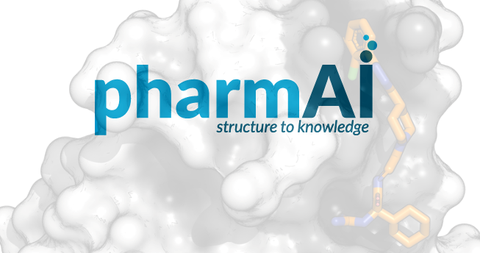Oct 21, 2019
TU spin-off invents software for drug research
Every year, German companies spend 6.2 billion euros on drug research and clinical trials with volunteers. In order to be able to develop new drugs, a new active substance must first be found that can be applied to the body's own target molecules. The Dresden-based company PharmAI was founded in June 2019 as a result of the BMWi-funded "Redivia" research project and has set itself the goal of systematically analyzing the ever faster-growing data pool of 3D protein structure data on the computer. The company founder and managing director Dr. Joachim Haupt comes from the bioinformatics working group of Prof. Dr. Michael Schroeder at the Technical University of Dresden. The DiscoveryEngine software technology is based on the analysis of protein structure data. Digital fingerprints are calculated from the geometry and physicochemical properties of the drug binding pockets or from the non-covalent interactions between the drug and the drug target. With the help of these fingerprints it is possible to analyse very large data sets in a very short time and thus identify new drug candidates or new drug targets for known drugs.
The DiscoveryEngine software from PharmAI analyses a database of more than 125,000 protein structures with the aim of identifying new applications for existing active substances, uncovering proteins responsible for side effects (so-called off-targets) and finding previously unknown substance classes for modulating drug targets. "The technology makes it possible to predict where existing drugs can also be used in other areas. For example, it is conceivable to find a malaria drug that could also be used effectively in cancer research. With our algorithm, we can systematically evaluate the active substances. This is much faster than with laboratory experiments and also reduces costs," explains Professor Schroeder. The PharmAI team has already been able to apply this so-called "drug repositioning" to Chagas' disease and Parkinson's so that new fields of application can be opened up with already known active substances. The classic "high-throughput screening", in which new active substances are searched for and from which new drugs are later developed, achieves a hit rate of 0.02% with previous methods. The "Focused Library Screening" developed by PharmAI allows pharmaceutical companies to increase the hit rate to 10%. This allows development costs to be reduced considerably and the chemical diversity of the active ingredients, which is essential for further development steps, to be significantly increased.
"It is impossible to test all 20,000-30,000 proteins of the human body in the laboratory using the conventional methods, but with our technology this can be achieved. We can cover almost all of the relevant human proteins in our data and run them against our algorithms to conduct studies. It increases the chance of success because more proteins can be tested for drug research," said Dr. Joachim Haupt describing the new technology. The young entrepreneurs would like to continue working closely with the TU Dresden and the research group led by Professor Dr. Schroeder even after the research funding has expired. Within the next two years, the company wants to grow to 10 to 20 employees and, above all, increasingly include the topic of artificial intelligence in order to advance the algorithms. "The forecasts are favorable, since the AI range could obtain enormous progress in the last years and the trend goes also further toward AI. We already have a specialist in our team and would like to expand our software further," says co-founder Dr. Florian Kaiser. In November, PharmAI will be present at BIO-Europe in Hamburg, Europe's largest partnering conference for the biotech industry, to present its product to new partners and customers from the pharmaceutical industry.
Contact for journalists
PharmAI GmbH Dr. Joachim Haupt www.pharm.ai

